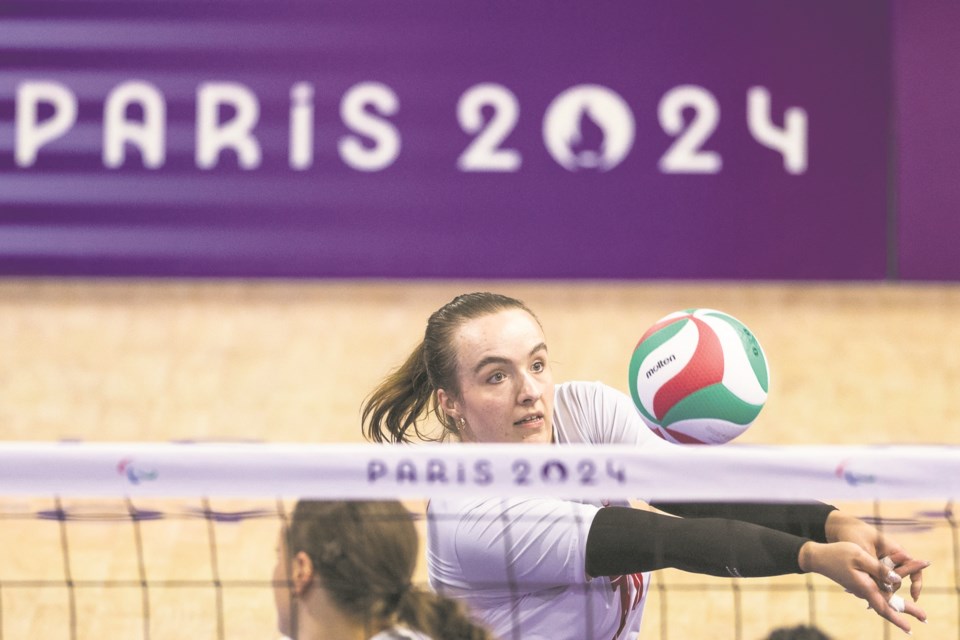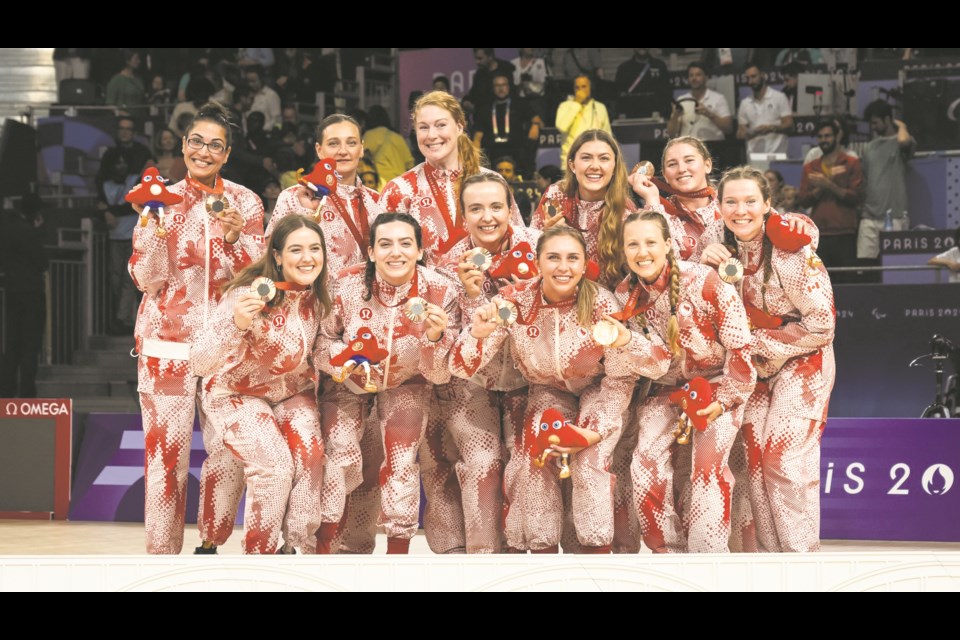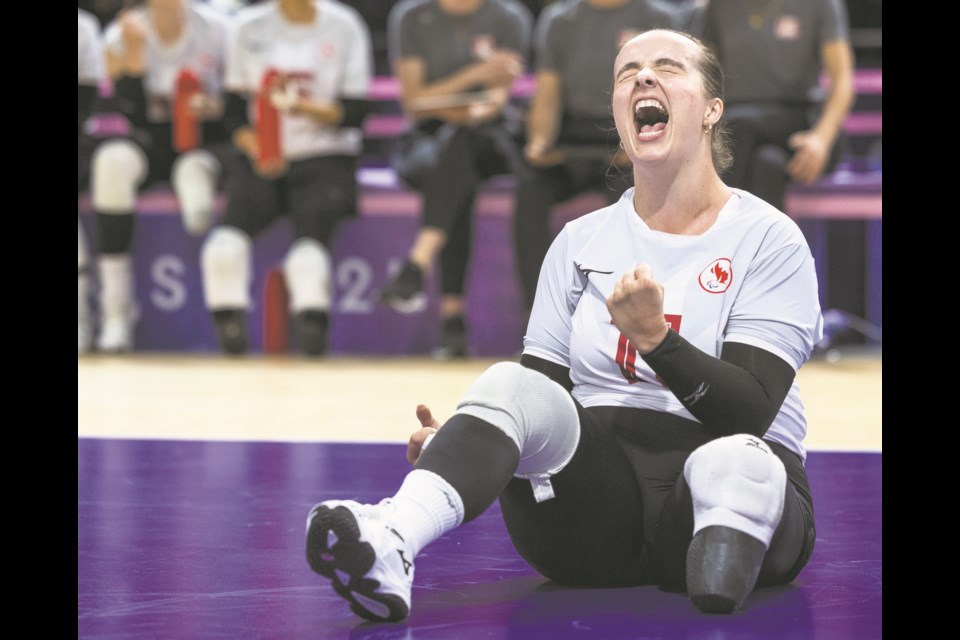Going into this year, Neerlandia native Heidi Peters said the Women's Sitting Volleyball team's only goal was to come home from the Paris Paralympic Games with a medal.
On Sept. 7, Peters and the rest of Canada's women's sitting volleyball team did that by defeating one of the sport's powerhouses and biggest rivals, Brazil, sweeping them in three sets.
"The medal is a lot heavier than I thought it would be," she said. "It is so heavy, it's crazy."
Peters has been a member of the team since 2013 after undergoing treatment for osteosarcoma, a bone cancer, which saw her left leg amputated. Her first Paralympics were the 2016 games in Rio de Janeiro.
Before her illness, Peters was a fixture on her volleyball school teams in junior high at Neerlandia Public Christian School and Barrhead Composite High School. Peters also played club volleyball in Grade 12, when she developed what she thought were shin splints but later discovered was cancer. The Paris Paralympic Games was her third games. Her first Paralympic appearance was in Rio de Janeiro in 2016; her second was in Tokyo in the COVID-delayed games in 2021. In 2016, Canada finished seventh, and in 2021, they narrowly missed the podium, placing fourth.
The experience
The Canadian contingent left for the Paralympics from Edmonton on Aug. 17, following a 10-day training camp at the Volleyball Pickleball Centre for Val-de-Reuil, France, where they spent a week to get acclimatized.
"It was really nice. We stayed at a small hotel, and we all had our own rooms," Peters said, adding they had stayed at the location in November 2023 before going to the 2023 World ParaVolley Sitting Volleyball World Cup in Cairo, Egypt, where they secured their spot in the Paralympics. "It was good to be somewhere familiar with everything we needed from an accessibility standpoint and quick and easy access to a gym, weight training."
She added that time was essential to overcoming the effects of the eight-hour time difference.
"For the first three or four days, although we were in the gym and practicing, it was just to keep our bodies moving. It wasn't until after that when we were truly ready to perform again," Peters said.
After the week, the squad moved into the athletes' village, about an hour away.
Peters said she was pleasantly surprised at how smoothly everything went. Checking in and getting their athletes' accreditation to "get to lounge on their cardboard beds" took roughly 30 minutes.
The beds were first introduced at the Tokyo Olympic and Paralympic Games as part of an initiative to make the games as eco-friendly as possible.
And while they may have been environmentally friendly, Peters confirms they were uncomfortable and "hard as a rock."
Fortunately, she said, the Canadian Paralympic Committee (CPC) knew of the shortfall and provided every athlete with mattress toppers and air conditioning units.
The latter was also important as the athlete village buildings were designed, at least in theory, in an eco-friendly way to moderate temperature, but sometimes the temperature won out.
"It wasn't too bad. There were a couple of days when I used it, but it was nice to have," Peters said, adding that having a bedroom to herself.
She also noted that, unlike her other Paralympic experiences, most sports, including sitting volleyball, had training facilities in the village.
Peters estimated that their training facility was roughly 800 metres from their dorm.
"Being able to walk to practice and not have to take a bus was so nice and so much more relaxing," she said. "The only time we had to leave the village was to go to our games."
Another feature of the Paris Paralympics, and the first for the games, was the addition of a nursery.
"It was great to see the improvements made for female athletes," she said. "One of my teammates [Jolan Wong] and her family came, including one of her [two] sons who is breastfeeding. They go down there and are with her family every day."
Not far from the Canadian team accommodations was a large dining room that could accommodate every culture and dietary need and restriction.
However, Peters said that despite that, there was relatively little selection, with the same dishes served every day.
At first, she said she wanted to try everything but restricted herself to foods she knew would work well for her.
It is also why Peters opted to stay in the dorm with two teammates instead of attending the opening ceremony.
"It's a multi-hour event, and there is a lot of standing, waiting, walking around and being hot," she said. "If we had not been playing the next day, I might have considered it, but I wanted to ensure I was at my best when we played."
The prelims
Canada opened up the Paralympics Aug. 29 with a win in the preliminary round against Slovenia, defeating them in three straight sets, 25-11, 25-21, and 25-12.
Unfortunately for the Sloveans, they missed one of their stronger players who did not make the games.
Peters said they knew it was essential to get off to a strong start if they were going to finish in the Top 2 in their pool and take the games they should win, knowing one of the world's powerhouses was in their pool.
In the Toyko Paralympics, Brazil edged Canada for the bronze medal and were the 2022 World ParaVolley champions.
"It was a beautiful venue," Peters said of the North Paris Arena. "Even though everything was purple."
It was also very accessible, with the train stop nearby, making it easy for the small army of Canadian supporters, including Peters' parents and two of her closest friends, to attend the matches.
In their next match, two days later, Canada lost to Brazil in four sets. They lost the first two sets 25-20 and 25-21, took the third set 25-23, and fell 25-19 in the final set.
"[Playing Brazil is always a fun matchup," Peters said but admitted they did not have their best outing. "We were the more emotional of the two teams, and I think we were a bit tentative and feeling them out, as we knew we could potentially face them later in a medal game."
In the final match, they convincingly dispatched Rwanda in three sets, 25-14, 25-17, and 25-13.
Semi-finals and meeting a hero
The squad then had two days off before playing China in the semi-finals.
For the most part, Peters said they stayed in the village and rested as much as they could between prepping for their game.
The exception was an event held at the Canadian Consulate for the Paralympians, hosted by the Sport and Physical Activity Minister Carla Qualtrough and former Paralympian in swimming, winning three Paralympic medals and four World Championship medals.
"That was extra special as I am a political science student, and she is literally my hero," she said.
Going into the semi-final against China, Peters said she knew they would be tough, as Canada, while taking sets off of them, had never lost a match.
"They hit the ball hard all the time, serve tough, defend well and have excellent ball control, which makes it hard to score against them," she said.
Peters said that Canada tried to play to their strengths to overcome that.
"We're a risky, serve touch, go-for-it kind of team, and in the end, that got the better of us," she said, adding China beat them in three sets.
Bronze medal game and future
In the bronze medal match, Canada bounced back from their previous game against Brazil, winning convincingly in three sets, 25-15, 25-18 and 25-18.
"It wasn't a perfect game, but everyone showed up, did their job and pulled each other along. It was a whole-team cohesive effort," she said.
As for how she feels about winning the gold medal, Peters said it is difficult to describe.
"Having that medal, having it put around my neck, feeling the weight of it in my hand. I know it is cheesy, but it is as close as I can get to magic," she said.
Peters hopes to experience this feeling again in four years at the 2028 Los Angeles Paralympic Games.
"I just love the sport. I hope to be involved in it in some capacity always."
Barry Kerton, TownandCountryToday.com






